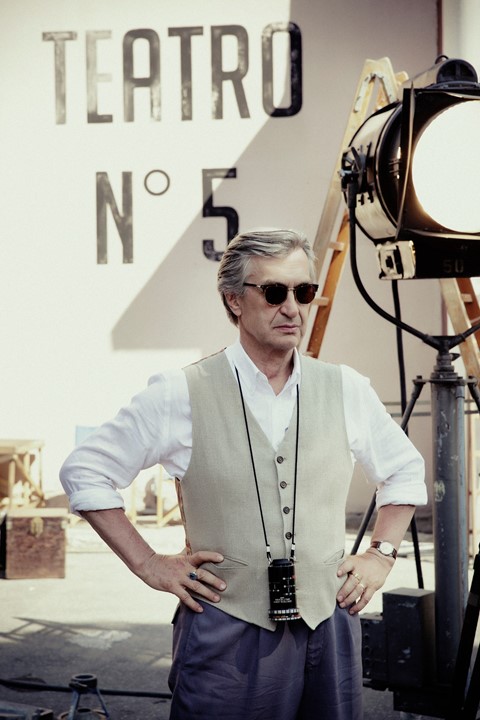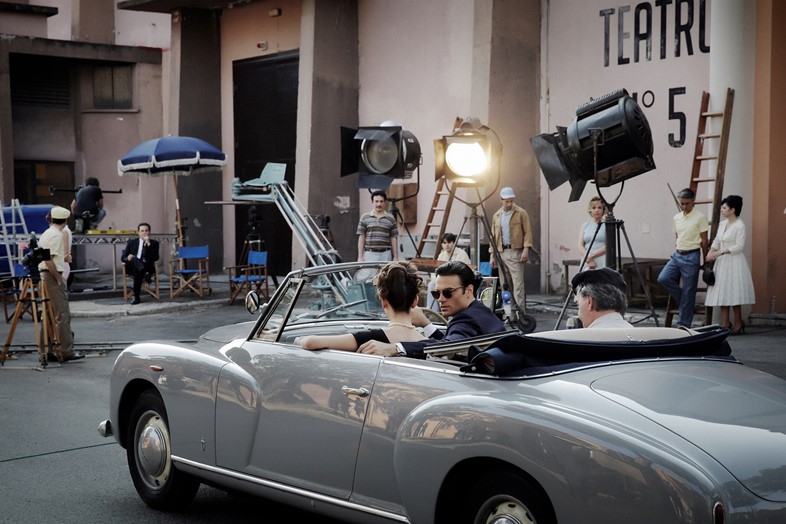AnOther speaks to the cinematic legend about filming his newest short in Fellini's favourite studio, and the allure of 60s cinémathèques
Wim Wenders is, unquestionably, one of the greatest storytellers of our time. His ability to communicate the depth of the human condition is perhaps unparallelled within contemporary cinema – and was, in fact, first borne of a childhood fascination with the American Western. The antithesis to the post-war ruins of his hometown of Düsseldorf, their broad, sweeping landscapes and existential suffering are vividly imprinted on his films which are often, as he explains, "extrapolations of Westerns into the present day".
It wasn't until Wenders was living in Paris as a poor art student, and seeking refuge from his cold apartment in the local cinematheque, that he discovered and subsequently embraced the heroes of European cinema: Bergman, Fellini, Antonioni (the latter of whom became a close friend to Wenders, collaborating with him in 1995 for Beyond the Clouds). Most recently, Wenders was appointed as the face of the newest Persol advertising campaign, and subsequently commissioned to direct an homage to the era he so reveres. The resulting short is a celebration of the brand's iconic 1950s 'Cellor' frames (which, this season, are updated with foldable functionality), lensed through the baroque elegance of the era. Filmed outside the legendary studio gates of Cinecittà – home to such renowned classics as Fellini's La Dolce Vita and Jean-Luc Godard's Contempt – it is a deeply evocative and yet witty short, a tribute to a different time communicated through Wenders' inimitable narrative style. Here, we speak to Wenders about how he discovered his love for cinema and why location plays a fundamental part in shaping his stories.

On the American Western...
"When I grew up, the first films I saw were all Westerns; Germany in the fifties was very much dominated by American culture and they were the antithesis to my German upbringing. In the city of Dusseldorf, where I grew up, everything was destroyed – but, in Westerns, there were these fantastic wide open landscapes where you could go forever and there was all that horizon and all that freedom. It was almost unimaginable for me. I liked the vastness of the landscapes, the cleanness, the adventure: I mean, I was a kid. Later on, when I started to make movies, I made a lot of road movies – and I think in a strange way that those were extrapolations of Westerns into the present day. I never worked with horses, so I never made a Western myself, but I liked the feeling of being on the road, and Westerns are really road movies just in a different kind of way."
"I made a lot of road movies – and I think in a strange way that those were extrapolations of Westerns into the present day." – Wim Wenders
On his cinematic education...
"In 1966, I was living in Paris in order to become a painter and I got sidetracked by the cinémathèque. I lived in a very cold little room under the roof and I was in bad need of somewhere warm and the cheapest warm room was a cinémathèque where you could see one film for one frank. So, five franks – which was next to nothing – could get you through the entire afternoon and into the night. I would watch every one of the five films that was showing – six on the weekends – and so I got a crash course in the history of cinema. I saw 1,200 films that year. In the end, I knew that cinema was it – so much better than painting, and so much less lonely... plus, my French was much improved."

On his collaboration with Persol...
"Persol asked me to evoke a certain period of Italian cinema because their glasses evoke the feel of the 50s and 60s. I liked the idea because some of my favourite filmmakers of all time are of that era – and I became friends with Fellini and even made a film with Antonioni, so I caught a glimpse of them and their work. The idea of making a little film that would evoke that classic period was a fun idea – and Cinecittà is such a legendary and mythical place in the European landscape of cinema that to make a film and to shoot there, even if it was just for one day, felt right. Cinecittà is where Fellini shot all his films so I said, 'I want to shoot in front of that studio gate.'"
"I don’t have to find locations because they’ve already found me." – Wim Wenders
On finding the right place...
"For me, it’s not about finding the right place – because mostly, I have the right place – but I try to find the right story. For most of my movies, I started with a desire to work in a certain location, but then I have to find the story that belongs to it. I don’t have to find locations because they’ve already found me; the real effort is to find the story that necessarily has to take place there and that couldn’t happen anywhere else. That’s of paramount importance to my work, the places are crucial to the story. For this short, almost the only thing we had to begin with was the set. I went there, walked around and spent some time on my own and just took in the atmosphere. Slowly, emerged this story of these two actors and this beautiful car. The climate of it made the story more than anything else, so it was almost like I just had to bring myself into the location."
The new, folding version of the Persol Cellor will be available at selected retailers worldwide from October 2015.